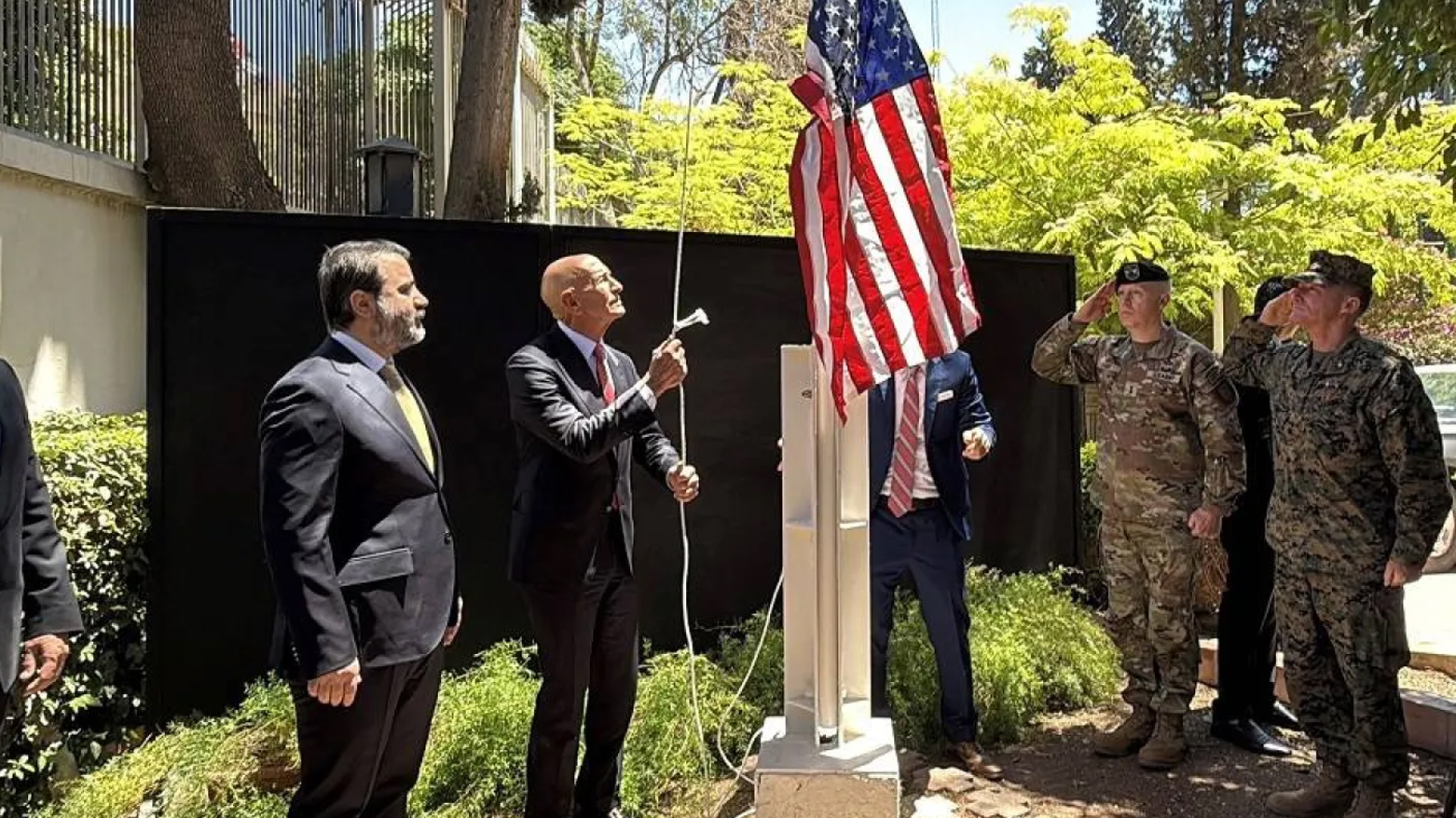Syrian Foreign Minister Visits Washington to Lobby for Removal of Remaining Sanctions
Syrian FM makes first Washington visit in 25 years to seek sanctions relief, as U.S. dismisses Istanbul-based Syria diplomats over SDF ties with Damascus.

Erbil (Kurdistan24) – Syrian Foreign Minister Asaad al-Shaibani is set to arrive in Washington on Thursday for high-level talks on Capitol Hill aimed at securing the permanent lifting of the final U.S. sanctions still imposed on Damascus. The visit, confirmed by lawmakers and U.S. officials, marks the first time in over a quarter of a century that a Syrian foreign minister has traveled to the American capital.
The visit comes at a pivotal moment as the United States intensifies its mediation between Israel and Syria to reach a new security agreement.
Senator Lindsey Graham told Axios that he and other Senators expect to meet Shaibani on Thursday to deliberate the Caesar Syria Civilian Protection Act, a sanctions framework enacted in June 2020 targeting the Assad regime and those conducting business with it in energy, construction, and finance. While the Trump administration issued temporary waivers, only Congress can formally vote to rescind the law. Graham said his support would be contingent on Syria joining the coalition against ISIS and advancing toward a concrete security arrangement with Israel.
On Friday, Shaibani is scheduled to meet Secretary of State Marco Rubio to continue the discussions.
According to sources familiar with the London talks, Shaibani and Israeli Strategic Affairs Minister Ron Dermer met for five hours with U.S. mediation. Israel presented a detailed proposal for demilitarized zones extending from southwest of Damascus to the Israeli border, modeled partly on the 1979 Israel-Egypt peace framework. The proposal included a no-fly zone for Syrian aircraft, restrictions on military deployments, and a phased Israeli withdrawal from Syrian territory occupied since the fall of the Assad regime, with the exception of an outpost on Mount Hermon.
The Syrian counter-proposal calls for Israel to withdraw from areas it occupied after Assad’s collapse in December 2024 and envisions the redeployment of a UN observer force to the buffer zone separating the two countries.
President Ahmad al-Sharaa confirmed on Wednesday that negotiations could yield results “in the coming days.” He described the potential security agreement as a “necessity,” insisting that it must safeguard Syria’s territorial integrity and airspace under UN monitoring. Al-Sharaa added that while a security deal could open the way to further agreements, normalization with Israel was not under discussion, stressing that Washington was not pressuring Damascus into concessions.
The push for sanctions relief has become central to Syria’s diplomatic campaign. The Caesar sanctions, originally designed to hold Bashar al-Assad’s regime accountable for torture and atrocities, remain the last binding measures on Damascus. U.S. officials have already signaled a major policy shift. In a landmark decision earlier this month, Washington formally lifted most economic sanctions on Syria, paving the way for foreign investment and economic recovery. U.S. Treasury Secretary Scott Bessent declared that General License 25 dismantled the prior sanctions framework and aligned with President Donald Trump’s pledge to “encourage new investment into Syria” as part of a broader strategy to stabilize the country after years of war.
For Syria, removing the remaining restrictions under the Caesar Act represents the final step toward reintegration into the global economy. Graham and other Senators, however, have conditioned their support on Damascus aligning more explicitly with U.S. security priorities, including combatting ISIS and reaching a durable accord with Israel.
Shaibani’s visit is unfolding as U.S. diplomacy seeks to manage delicate regional balances. Israel’s proposals for a new demilitarization framework are being weighed against Syria’s insistence on sovereignty and UN oversight, while Washington’s interest lies in consolidating a regional security architecture that reduces volatility.
Israeli Prime Minister Benjamin Netanyahu has indicated his interest in meeting al-Sharaa on the sidelines of the UN General Assembly later this month, though Israeli officials caution the likelihood remains low. Netanyahu has already confirmed that President Trump invited him to the White House on September 29.
U.S. Diplomatic Shake-Up Raises Questions
In a parallel development, Reuters reported that several of the most senior U.S. diplomats working on Syria at the Syria Regional Platform (SRP) in Istanbul — Washington’s de facto mission to the country since the embassy in Damascus closed in 2012 — were abruptly dismissed last week. The departures, described by Reuters as sudden and involuntary, come as U.S. special envoy Tom Barrack consolidates a policy push favoring integration of U.S.-backed Syrian Kurdish forces into the central government under President al-Sharaa.
While a State Department official declined to comment on personnel decisions, sources told Reuters that the dismissals reflected internal divergences over how quickly the Kurdish-led Syrian Democratic Forces should ratify their March deal with Damascus. Barrack has pressed for their integration into national security structures, while elements of the SDF remain reluctant to cede autonomy.
Western diplomats noted that the shake-up underscores Washington’s recalibrated approach, aligning with Barrack’s direct engagement in Damascus, where he recently oversaw the signing of a reconciliation plan with Druze leaders in the south. For many observers, the abrupt reshuffling of U.S. staff highlights the extent to which Washington’s Syria policy is being reshaped around a vision of centralized state authority under al-Sharaa, even as sensitive negotiations with Israel and Kurdish forces continue to unfold.
Updated in Sep. 18, 2025, at 11:51 AM